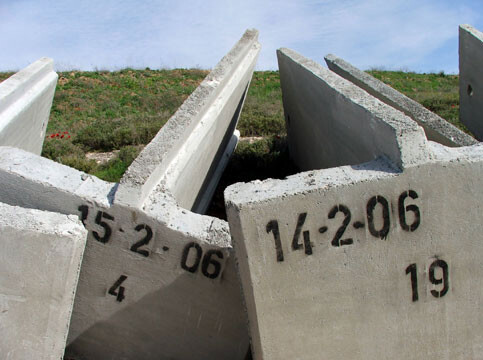10 July 2006

Slabs of the wall being put up around Shavei Shomron settlement, near Nablus (Maureen Clare Murphy)
8 July 2006
Dear Member States of the United Nations:
Two years ago, on 9 July 2004, the International Court of Justice (ICJ) ruled that Israel’s construction of the Wall in the occupied West Bank violated international law, and called inter alia for the parts situated on occupied territory to be dismantled. The signatories of this appeal would like to update you on Israel’s continued construction of the Wall in contravention of international law.
Immediately after the ICJ Advisory Opinion was issued, the Israeli government rejected it outright, and declared that the construction of the Wall would continue. The United Nations Office for the Coordination of Humanitarian Affairs (UN OCHA) has estimated that when the ICJ Advisory Opinion was issued, approximately 185 kilometres of the Wall had been constructed. By May 2006, it estimated that 362 kilometres of the Wall had been constructed and a further 88 kilometres were under construction.
On 15 September 2005, the Israeli High Court of Justice also dismissed the ICJ’s ruling. Notably, it disagreed with the ICJ on the relevance of Israeli settlements to the legality of the Wall. Whereas the ICJ unanimously held that Israeli settlements in the West Bank are illegal, the Israeli High Court of Justice held, in a case concerning a part of the Wall surrounding an Israeli settlement, that:
The military commander is authorized to construct a separation fence in the area for the purpose of defending the lives and safety of the Israeli settlers in the area. It is not relevant whatsoever to this conclusion to examine whether this settlement activity conforms to international law.
There is a fundamental legal flaw to this argument. When a state violates international law, it is obliged to undo its illegal act, if physically possible. This means dismantling the settlements. With the settlements dismantled, there would be no conceivable reason to build the Wall on Palestinian territory in order to protect Israeli settlers.
Moreover, there is a clear link between settlements and the Wall, both of which participate in confiscation and ultimately annexation of Palestinian land. In a recent detailed study, Israeli human rights organizations B’Tselem and Bimkom showed that the route of the Wall in many instances coincides with settlement expansion plans. On 15 June 2006, the Israeli High Court of Justice issued a judgment rebuking the Israeli government for concealing such an expansion plan in a case relating to the route of the Wall. On 8 March 2006, then Israeli Acting Prime Minister Ehud Olmert stated that “the course of the fence - which until now has been a security fence - will be in line with the new course of the permanent border.” In November 2005, then Justice Minister Tzipi Livni said that it will serve as “the future border of the state of Israel.”
The purpose of confiscation is also reflected in the difficulties that Palestinians behind the Wall face in accessing their lands between Israel’s internally accepted borders and the Wall (the “seam zone”). An Israeli permit is required to reach these lands and, according to UN OCHA, in July 2005 38 percent of the applications for a permit were denied. There is an increasing tendency to grant permits only to registered land owners and their direct descendants, thereby excluding most of the workforce in the labour-intensive Palestinian agricultural sector. Those who manage to obtain a permit face several further obstacles - gates are few and far apart, have limited and irregular opening hours, and farm vehicles or tools are frequently not allowed to pass. As a result, there is an increasing tendency for land in the seam zone not to be cultivated. In addition to the severe restrictions on the exercise of basic human rights, this situation facilitates Israeli land confiscation under laws allowing areas not cultivated for three consecutive years to be declared as “state land.” In the past, the “state land” technique has been the main means of Israeli land confiscation in the West Bank. According to UN OCHA, much of the land in the seam zone has already been declared “state land” by the Israeli authorities.
The Israeli actions on the ground and statements by Israeli officials indicate that de facto land confiscation is a major motivation behind the construction of the Wall. It is pertinent to recall that two years ago the ICJ held that:
The construction of the wall and its associated regime create a “fait accompli” on the ground that could well become permanent, in which case, and notwithstanding the formal characterization of the wall by Israel, it would be tantamount to de facto annexation.
As recalled by numerous United Nations resolutions, international law prohibits the acquisition of territory by force, rendering void any attempts to annex land.
In addition to noting several third-party state obligations to ensure Israel’s respect for international law with regard to the Wall, the ICJ held that:
The United Nations, and especially the General Assembly and the Security Council, should consider what further action is required to bring to an end the illegal situation resulting from the construction of the wall and the associated regime, taking due account of the present Advisory Opinion.
In light of this finding by the ICJ, the signatories of the present appeal call on all UN Member States to request the President of the General Assembly to reconvene its tenth emergency special session in order to:
Sincerely,
Sha’wan Jabarin
General Director
Al-Haq
Raji Sourani
Director
Palestinian Centre for Human Rights
Hassan Jabareen
General Director
Adalah
Issam Younis
General Director
Al-Mezan
Related Links